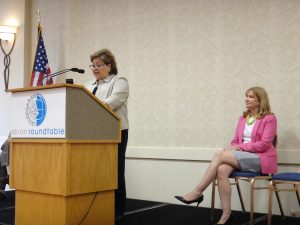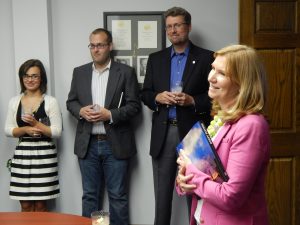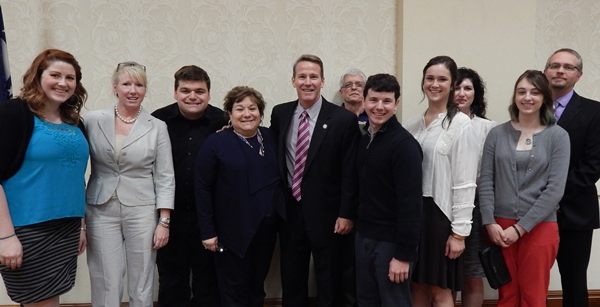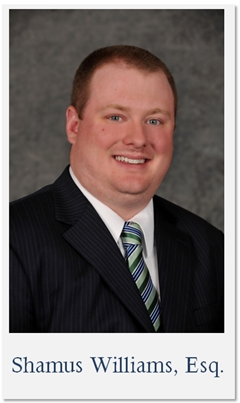July 22, 2014 •
State and Federal Communications Welcomes Diane Laney Fitzpatrick at Akron Roundtable Reception
On the third Thursday of each month, State and Federal Communications attends the Akron Roundtable luncheons. However, July 17th was a special day for us. The luncheon featured keynote speaker Diane Laney Fitzpatrick, author of the book Home Sweet Homes: How Bundt […]
 On the third Thursday of each month, State and Federal Communications attends the Akron Roundtable luncheons. However, July 17th was a special day for us. The luncheon featured keynote speaker Diane Laney Fitzpatrick, author of the book Home Sweet Homes: How Bundt Cakes, Bubble Wrap, and My Accent Helped Me Survive Nine Moves.
On the third Thursday of each month, State and Federal Communications attends the Akron Roundtable luncheons. However, July 17th was a special day for us. The luncheon featured keynote speaker Diane Laney Fitzpatrick, author of the book Home Sweet Homes: How Bundt Cakes, Bubble Wrap, and My Accent Helped Me Survive Nine Moves.
Our President and CEO Elizabeth Bartz, a dear friend and fellow Kent State alum of Fitzpatrick, introduced the Ohio native at the Roundtable to talk about how “The Journey of a Thousand Miles… is for Amateurs” and just how she has redefined the meaning of “stay-at-home-mom.” The entire audience was often thrown into spells of laughter as Fitzpatrick comically recalled the eight lessons she learned through her 7,000 mile journey across the states.
 Immediately following the program, State and Federal Communications hosted a reception for the speaker, held on the second floor of our building. A large portion of the crowd from the Roundtable luncheon attended the gathering and enjoyed the refreshments as well as a second opportunity to talk with Fitzpatrick. Towards the end of the reception, Elizabeth presented the speaker a Greater Akron book with a spread featuring State and Federal Communications. It was the perfect gift for Fitzpatrick to keep Akron in the back of her mind just in case she ever wants to return!
Immediately following the program, State and Federal Communications hosted a reception for the speaker, held on the second floor of our building. A large portion of the crowd from the Roundtable luncheon attended the gathering and enjoyed the refreshments as well as a second opportunity to talk with Fitzpatrick. Towards the end of the reception, Elizabeth presented the speaker a Greater Akron book with a spread featuring State and Federal Communications. It was the perfect gift for Fitzpatrick to keep Akron in the back of her mind just in case she ever wants to return!
July 22, 2014 •
Miami-Dade County Lengthens its Revolving Door Restriction
The Miami-Dade Board of County Commissioners approved an ordinance lengthening the county’s revolving door prohibition. Under current law, the revolving door restriction period is two years. Ordinance 141569 amends existing county law by prohibiting county officials and their staff members […]
 The Miami-Dade Board of County Commissioners approved an ordinance lengthening the county’s revolving door prohibition. Under current law, the revolving door restriction period is two years.
The Miami-Dade Board of County Commissioners approved an ordinance lengthening the county’s revolving door prohibition. Under current law, the revolving door restriction period is two years.
Ordinance 141569 amends existing county law by prohibiting county officials and their staff members from lobbying the county for a period of four years. The ordinance exempts certain former county officials who become lobbyists for governmental entities, nonprofit organizations, or educational institutions from the four year restriction period.
The board adopted the ordinance in a 7-5 vote in its July 15, 2014, meeting.
The next step in the legislative process is a public hearing before the Public Safety and Animal Services Committee, which is scheduled for August 27, 2014, at 9:30 a.m. The outcome of the public hearing will determine the effective date of the new legislation.
July 22, 2014 •
Presidential Executive Order Prohibits Federal Contractors from Discriminating Against LGBT Employees
On July 21, President Obama signed an executive order prohibiting federal contractors from discriminating against lesbian, gay, bisexual, and transgender (LGBT) employees. The order also prohibits discrimination based on gender identity in federal employment. The White House press release states, […]
 On July 21, President Obama signed an executive order prohibiting federal contractors from discriminating against lesbian, gay, bisexual, and transgender (LGBT) employees. The order also prohibits discrimination based on gender identity in federal employment.
On July 21, President Obama signed an executive order prohibiting federal contractors from discriminating against lesbian, gay, bisexual, and transgender (LGBT) employees. The order also prohibits discrimination based on gender identity in federal employment.
The White House press release states, “No current federal law adequately protects [LGBT] workers from employment discrimination. … At a critical time for our nation’s economy, we need all of our workers to be focused on making the most of their talent, skill, and ingenuity, rather than worrying about losing their job due to discrimination.”
The order amends two prior executive orders from the 1960s, issued by Presidents Johnson and Nixon, prohibiting discrimination based on “race, color, religion, sex, or national origin.”
July 22, 2014 •
Tuesday Lobbying and Campaign Finance News Update
Lobbying “New king of K Street” by Megan R. Wilson in The Hill. “Business Bottom Line” in The Hill. “How to Disclose Your Lobbying While Keeping the Public In the Dark” by Ben Geman in National Journal. Texas: “Activist fined […]
 Lobbying
Lobbying
“New king of K Street” by Megan R. Wilson in The Hill.
“Business Bottom Line” in The Hill.
“How to Disclose Your Lobbying While Keeping the Public In the Dark” by Ben Geman in National Journal.
Texas: “Activist fined $10,000 for not registering as lobbyist” by David Saleh Rauf in the Houston Chronicle.
Campaign Finance
“Want to reduce polarization? Give parties more money.” by Ray LaRaja and Brian Schaffner in The Washington Post.
“Politicos souring on FEC advice?” by Dave Levinthal in The Center for Public Integrity.
“Money gap: Why don’t women give?” by Anna Palmer and Tarini Parti in Politico.
Massachusetts: “Mass. Senate To Debate PAC Disclosure Bill” by The Associated Press on WBUR.
Ethics
“Stars may be aligning for transparency legislation” by Josh Gerstein in Politico.
Pennsylvania: “State Ethics Commission confirms investigation of Pennsylvania’s legislative sting case” by Charles Thompson in The Patriot-News.
Congress
“… And Congress punts” by Burgess Everett in Politico.
“Issues pile up in Congress” by Jake Sherman in Politico.
“One chart that shows Congress can actually get things done” by Chris Cillizza in The Washington Post.
“Members of Congress Plan to Live on Minimum Wage for a Week” by Scott Wilson on ABC News.
Government Tech and Social Media
“Washington D.C. Launches Open Data Policy, FOIA Portal” in Government Technology.
July 21, 2014 •
Monday News Roundup
Lobbying “Small K Street shops see business boom” by Megan R. Wilson in The Hill. “Lobbyists Of All Kinds Flock To Farm Bill” by Peggy Lowe and Harvest Public Media on KUNC. New York: “Taxpayer money used to pay lobbyists” […]
 Lobbying
Lobbying
“Small K Street shops see business boom” by Megan R. Wilson in The Hill.
“Lobbyists Of All Kinds Flock To Farm Bill” by Peggy Lowe and Harvest Public Media on KUNC.
New York: “Taxpayer money used to pay lobbyists” by Joseph Spector on WGRZ News.
New York: “Four lobbying groups can keep donors private” by Joseph Spector in The Journal News.
New York: “New Bitcoin Lobbying, Trade Association Announced” by Paul Vigna in The Wall Street Journal.
Campaign Finance
Alaska: “APOC fines Anchorage Mayor Sullivan for campaign finance law violation” by Devin Kelly in the Alaska Dispatch News.
Orange County, CA: “FPPC role in campaign finance will go to vote” by Jill Cowan in the Daily Pilot.
Florida: “More than $200 million in outside money floods Florida elections since ‘Citizens United’” by Alex Leary in the Tampa Bay Times.
Michigan: “Outside groups influence campaigns” by Todd Spangler in the Lansing State Journal.
New Hampshire: “Can N.H.’s New Campaign Finance Rules Hold Up In Court?” by Brian Wallstin on New Hampshire Public Radio.
Tennessee: “Follow the Money: Hill, Van Huss campaign finances largely from outside PACs” by Gary B. Gray in the Johnson City Press.
Ethics
Pennsylvania: “Pennsylvania’s members of Congress take more free, legal trips” by Hope Yen (Associated Press) in The Sentinel.
South Carolina: “Recent developments show SC government growing less transparent” by Jamie Self in the Rock Hill Herald.
July 21, 2014 •
California FPPC Adopts Dark Money Regulations
The Fair Political Practices Commission (FPPC) has adopted updates to regulations affected by the recent enactment of Senate Bill 27. The new law closes “dark money” loopholes used to avoid disclosure of contributors by requiring large donations from nonprofits and […]
 The Fair Political Practices Commission (FPPC) has adopted updates to regulations affected by the recent enactment of Senate Bill 27. The new law closes “dark money” loopholes used to avoid disclosure of contributors by requiring large donations from nonprofits and other multipurpose organizations to be reported.
The Fair Political Practices Commission (FPPC) has adopted updates to regulations affected by the recent enactment of Senate Bill 27. The new law closes “dark money” loopholes used to avoid disclosure of contributors by requiring large donations from nonprofits and other multipurpose organizations to be reported.
The new regulations modify the definition of “contribution” to include a payment made to a multipurpose organization when used for a contribution or expenditure by the multipurpose organization. Large transfers from one multipurpose organization to another will now require the original source of the funds to be disclosed. The top 10 contributors to state committees will be posted online by the FPPC.
Hawaii Gov. Neil Abercrombie is seeking candidates and recently expediting appointments for various state boards and commissions. More than two dozen volunteer members resigned following the enactment of Senate Bill 2682, a bill requiring them to make their financial disclosure […]
 Hawaii Gov. Neil Abercrombie is seeking candidates and recently expediting appointments for various state boards and commissions. More than two dozen volunteer members resigned following the enactment of Senate Bill 2682, a bill requiring them to make their financial disclosure statements available to the public as well as to the Hawaii State Ethics Commission.
Hawaii Gov. Neil Abercrombie is seeking candidates and recently expediting appointments for various state boards and commissions. More than two dozen volunteer members resigned following the enactment of Senate Bill 2682, a bill requiring them to make their financial disclosure statements available to the public as well as to the Hawaii State Ethics Commission.
Originally on his list of bills to veto, Abercrombie allowed the financial disclosure bill to become law without his signature.
The Natural Energy Laboratory of Hawaii, the State Land Use Commission, the Agribusiness Development Corporation, the Hawaii Board of Land and Natural Resources, the Hawaii Housing Finance and Development Corporation, and the University of Hawaii Board of Regents are among those having lost members as an unintended consequence of the bill aimed at increasing transparency. Some were forced to cancel meetings because they lacked enough members for a quorum.
July 21, 2014 •
Lobby Comply: Four Years and 3000 Posts!
Since July 2010, Lobby Comply has been bringing lobbying, campaign finance, and ethics news and analysis to government relations professionals. We keep a close eye on everything happening at the federal level, in the states, and in hundreds of municipalities. […]

Since July 2010, Lobby Comply has been bringing lobbying, campaign finance, and ethics news and analysis to government relations professionals. We keep a close eye on everything happening at the federal level, in the states, and in hundreds of municipalities.
We are proud to mark our 3000th blog post!
July 18, 2014 •
Up in the Air
It is summer and you know what that means in state government affairs. Meetings. Meetings. Meetings. Okay, I know many of you will not be at the first one but I will see you at many of the other places […]
 It is summer and you know what that means in state government affairs. Meetings. Meetings. Meetings.
It is summer and you know what that means in state government affairs. Meetings. Meetings. Meetings.
Okay, I know many of you will not be at the first one but I will see you at many of the other places across the continental United States.
1. Greek Orthodox Clergy-Laity Congress—July 6-10 in Philadelphia, Pennsylvania;
2. National Governors Association—July 10-July 13 in Nashville, Tennessee;
3. Council of State Governments MLC—July 13-July 16 in Omaha, Nebraska;
4. IACREOT Conference—July 23-24 in Bonita Springs, Florida;
5. NCSL Legislative Leaders—July 24-25 in Washington, DC;
6. Council of State Governments National and Western Annual Conference—
August 9-13 in Anchorage, Alaska; and
7. National Conference of State Legislatures—August 18-22 in Minneapolis, Minnesota.
Now that is a lot of traveling for anyone to handle. I skipped a couple of the other regional CSG meetings because…well, I do need to stop at the office and home every once in a while.
Follow the travel either on Facebook or Twitter @elizabethbartz. You may enjoy the photos and the opportunities or it just might tire you out. Either way, it will not be boring.
Looking forward to sharing with you my reflection of owning State and Federal Communications for 21 years in next month’s issue. Stay tuned.
July 18, 2014 •
Our July Photo Scrapbook


![The Go Red for Women Luncheon at Quaker Station in Akron, Ohio offered attendees the opportunity to wear exciting costumes - all in red. Attending this year's event were [left to right] Zack Koozer, Joe May, John Chames, Elizabeth Z. Bartz, David Jones, and Nikos Frazier.](http://stateandfed.com/wp-content/uploads/2014/07/Go-Red-team.png)
![At a recent Akron Roundtable, Cuyahoga County Executive and Democratic candidate for governor Edward “Ed” FitzGerald [pictured center] spoke to the attendees about his ideas and plans to run Ohio. Attending were [left to right] Rachel Rodgers, David Jones, Zack Koozer, Ken Kelewae, Joe May, Elizabeth Z. Bartz, Alessandra Dickos, Elaina Laikos, and Melissa Coultas.](http://stateandfed.com/wp-content/uploads/2014/07/Akron-Roundtable-with-Ed-Fitzgerald.jpg)
Q. Do gift laws preventing registered lobbyists and employers from giving gifts to public officials, also prohibit gifts to the family members of public officials? A. Generally, in states that feature a prohibition on lobbyists giving gifts to public officials […]
 Q. Do gift laws preventing registered lobbyists and employers from giving gifts to public officials, also prohibit gifts to the family members of public officials?
Q. Do gift laws preventing registered lobbyists and employers from giving gifts to public officials, also prohibit gifts to the family members of public officials?
A. Generally, in states that feature a prohibition on lobbyists giving gifts to public officials or employees, the prohibition will extend to members of the public officials’ immediate family. However, immediate family is usually a defined term and will vary by jurisdiction.
For example, Alabama law prohibits lobbyists and employers of lobbyists from offering or providing a thing of value to a public employee, public official, or family member of a public employee or public official. The state defines a family member of a public employee as a spouse or dependent. A family member of a public official is defined as the spouse, dependent, adult child and his or her spouse, spouse’s parent, and siblings of spouse and their respective spouses.
In Kentucky, the General Assembly just passed House Bill 28, which extends the prohibition on gifts to family members of legislators or candidates. Effective July 14, 2014, registered legislative lobbyists will be prohibited from giving gifts to spouses or children of legislators or candidates for General Assembly.
In Pennsylvania, gifts are also prohibited to immediate family members of public officials, employees, or candidates for public office. They interpret immediate family members to include spouses, children, parents, and siblings.
However, not all states include family members in the gift prohibitions. Minnesota’s gift prohibition applies to public officials, employees of the Legislature, and local officials, but it does not extend to their family members.
Before giving a gift to a public official or employee, you should consult the jurisdiction’s ethics commission. Do not expect officials or their family members to know the applicable laws.
You can directly submit questions for this feature, and we will select those most appropriate and answer them here. Send your questions to: marketing@stateandfed.com.
(We are always available to answer questions from clients that are specific to your needs, and we encourage you to continue to call or e-mail us with questions about your particular company or organization. As always, we will confidentially and directly provide answers or information you need.) Our replies to your questions are not legal advice. Instead, these replies represent our analysis of laws, rules, and regulations.
July 18, 2014 •
News You Can Use Digest – July 18, 2014
National: America’s Shifting Statehouse Press Pew Center on the States – Jodi Enda, Katarina Eva Masta, and Jan Lauren Boyles | Published: 7/10/2014 After more than a decade of scaling back, newspapers still send more reporters to cover state Capitols than […]

National:
America’s Shifting Statehouse Press
Pew Center on the States – Jodi Enda, Katarina Eva Masta, and Jan Lauren Boyles | Published: 7/10/2014
After more than a decade of scaling back, newspapers still send more reporters to cover state Capitols than any other medium. But the print journalists who remain now work shoulder to shoulder with students and reporters from non-traditional outlets, shows a new survey. The rise of those non-traditional outlets may be the most significant development in statehouse press coverage in the last five years, although no historical data is available to chart their rise. They include publications that tailor to insider audiences, nonprofit news organizations, and ideologically driven news sites.
Federal:
Hobbled IRS Can’t Stem ‘Dark Money’ Flow
The Center for Public Integrity – Julie Patel | Published: 7/15/2014
The scandal over the IRS targeting conservative groups, combined with Congress systematically stripping the agency of resources and clout over decades, has led to an exempt organizations division that has all but quit regulating politically active nonprofits in any consistent, demonstrable way, according to a Center for Public Integrity investigation. The IRS came to a near standstill on deciding whether it should grant “social welfare” nonprofit status to conservative and liberal groups. An exempt organizations division staffer said the IRS knew many of these groups were highly political, but “we stalled so we wouldn’t have to say no.”
From the States and Municipalities:
Alaska – APOC Rejects Complaint That Parents Should Be Registered Lobbyists
Alaska Dispatch – Richard Mauer (Anchorage Daily News) | Published: 7/11/2014
The Alaska Public Offices Commission (APOC) determined there was no merit to a complaint filed by former middle school math teacher and legislative candidate David Nees that said parents who volunteered to spend the last month of the legislative session in Juneau seeking money for schools should have registered as paid lobbyists. APOC ruled that even if his allegations were true, there would be no violation of the law because the parents were unpaid and their lobbying trips unsubsidized by others.
California – San Diego’s Ethics Commission Votes to Reign in Independent Committees
inewssource.org – Joe Yerardi | Published: 7/11/2014
The San Diego Ethics Commission voted to forward a proposal to city council that would have the practical effect of ending independent committees taking campaign videos published on candidates’ web sites, downloading them, and paying television stations to run them as advertisements. Specifically, the rule would expand the definition of ‘contribution” to include the republication and dissemination of many candidates’ campaign-created materials. Independent committees are usually prohibited from making contributions of any kind to candidates for city office. So replicating candidates’ videos would constitute an illegal non-monetary contribution to a campaign.
Connecticut – Banned Donors Skirt Law Designed To Prevent Pay-To-Play
Hartford Courant – Dave Altimari and Matthew Kauffman | Published: 7/13/2014
Corporations are donating to the federal fundraising accounts of Connecticut’s political parties to navigate around laws banning employees of some companies from giving to candidates for state office. The State Elections Enforcement Commission earlier this year warned federal laws do not “create a loophole” allowing prohibited donors to support state campaigns. The Legislature in 2005 enacted limits on political contributions by state contractors after a kickback scandal that ultimately led to federal prison terms for former Gov. John Rowland and others.
Georgia – Georgia Ethics Chief Claims Lawyer for Gov. Deal Made Threat over Ethics Complaints
Greenfield Daily Reporter – Christina Cassidy (Associated Press) | Published: 7/14/2014
Holly LaBerge, executive secretary of Georgia’s ethics commission, said top aides to Gov. Nathan Deal once threatened to thwart efforts to expand the agency’s authority unless she made campaign finance complaints against the governor “go away.” The governor and his staff have repeatedly denied any interference with the case, which was settled for $3,350 in fines. LaBerge’s attorney said she was speaking out under the state’s whistleblower law and wanted to make sure she would not be retaliated against. In a television interview, LaBerge said she was tired of being accused of carrying out favors on Deal’s behalf.
Indiana – Slippery Government Ethics Rules Raise Calls for Reforms
Indianapolis Star – Tony Cook, Ryan Sabalow, and Eric Weddle | Published: 7/10/2014
Like many states, Indiana has laws intended to prevent long-recognized ethical problems. State officials are restricted from using government resources for political purposes, must disclose certain financial interests, and are supposed to wait at least a year before taking a job with a company they regulate or whose contracts they administer. But in Indiana, there are lots of exceptions to those rules, which were on display in recent cases involving former Superintendent of Schools Tony Bennet, top transportation official Tony Wodruff, and state Rep. Eric Turner.
Kentucky – Meet the Nation’s Most Honest Politician
CNN – Wade Payson-Denney | Published: 7/16/2014
Gil Fulbright is a fake political candidate, appearing in a brutally honest viral video. Actor Frank Ridley plays the character of a money-hungry politician, who lets the public know in his ad that the issues do not matter, as long as he can get re-elected. The faux campaign is raising real money, even though Fulbright’s name will not appear on any ballot. Represent.Us is sending this character to campaign events in Kentucky to bring a message to the public – limit the influence of money in politics.
Maryland – Excuses Abound for Md. Campaign Report Failings
CapitalGazette.cm; Associated Press – | Published: 7/14/2014
Jared DeMarinis, the director of candidacy and campaign finance for the Maryland Board of Elections, is the person that candidates call when they receive notification the state is assessing them for failing to file timely campaign finance reports. Because the reports are filed electronically, about the only thing DeMarinis has not heard is that the dog ate the report. By far, the most popular excuse is that the campaigns did not understand the software they are required to use.
Pennsylvania – Convicted of Crimes, They Now Have Plaques under Their Portraits
Philadelphia Inquirer – Angela Couloumbis | Published: 7/15/2014
In the Pennsylvania Capitol, roughly two dozen portraits of legislative leaders hang in a place of honor near the rotunda. As of this week, some of them come with a footnote. Plaques were placed beneath the portraits of three former House speakers and a former Senate president pro tempore listing when the lawmakers left office –and when they were sentenced to prison.
Pennsylvania – Ethics Board to Consider Stricter Campaign Finance Regulations
Philadelphia Inquirer – Claudia Vargas | Published: 7/16/2014
Looking ahead to the 2015 mayoral campaign, the Philadelphia Board of Ethics met to work out a series of proposed changes to the city’s campaign finance regulations. Given the rise in independent campaign contributions and coordinated expenditures nationwide, the board’s director of enforcement, Michael Cooke, said the panel should add specific language to the existing regulations to make clear what counts as a contribution and for what purposes. A public hearing on the proposed amendments will be held on September 7.
South Carolina – South Carolina’s State Ethics Commission Restricts Media Policy
Charleston Post & Gazette – Jeremy Borden | Published: 7/16/2014
South Carolina Ethics Commission Chairperson James Burns said until the agency has an official policy for dealing with the media, all comments made to news media should come from Director Herb Hayden. Deputy Director Cathy Hazelwood has acted as the primary spokesperson for the commission, and has often been forthright on issues before the agency. Media attorney Jay Bender said the move to change the policy without a motion, discussion, or vote was against the state’s open records laws. “…If we had more people in government like Cathy Hazelwood, we’d have a better government,” said Bender.
Tennessee – Carr Gave Loan to Company of Political Supporter
The Daily Journal – Chas Sisk (The Tennessean) | Published: 7/15/2014
Tennessee Rep. Joe Carr loaned Life Watch Pharmacy $200,000 last year from his campaign fund. The company is led by conservative fundraiser Andrew Miller, who gave Carr $2,600 for his primary and general election campaigns. Miller also has been the largest donor to the Real Conservatives National Committee, giving $22,500 to the super PAC. Carr has been waging a tea party battle to defeat U.S. Sen. Lamar Alexander.
Utah – Former Utah Attorneys General John Swallow, Mark Shurtleff Arrested
Deseret News – Pat Reavy and Dennis Romboy | Published: 7/15/2014
Former Utah Attorneys General John Swallow and Mark Shurtleff were arrested and now face multiple felony counts, including accepting bribes and destroying evidence. The two are accused of accepting hundreds of thousands of dollars in gifts and campaign contributions from individuals facing legal action in return for favorable treatment from the attorney general’s office.
Wisconsin – After Subpoenas in Walker Criminal Probe, WI GOP Sought to Quietly Change Law
Center for Media and Democracy – Brendan Fischer | Published: 7/15/2014
New documents indicate that weeks after the first subpoenas were issued in Wisconsin’s “John Doe” criminal campaign finance probe in October 2013, state Senate Republicans began working to change the law to legalize the activities under investigation. Republicans surprised many when they tried to rush Senate Bill 654 through the Legislature to explicitly carve-out an exception to the state’s campaign finance statutes for issue ads, the election messages that stop short of telling viewers to vote for or against a candidate.
 State and Federal Communications produces a weekly summary of national news, offering more than 80 articles per week focused on ethics, lobbying, and campaign finance.
State and Federal Communications produces a weekly summary of national news, offering more than 80 articles per week focused on ethics, lobbying, and campaign finance.
News You Can Use is a news service provided at no charge only to clients of our online Executive Source Guides, or ALERTS™ consulting clients.
July 17, 2014 •
Thursday News Roundup
Lobbying “Who Has Time for Legislating Anyway? | K Street Files” by Kate Ackley in Roll Call. “K Street eyes spending bills to stop Obama” by Megan R. Wilson and Tim Devaney in The Hill. Kentucky: “U.S. Rep. Ed Whitfield […]
 Lobbying
Lobbying
“Who Has Time for Legislating Anyway? | K Street Files” by Kate Ackley in Roll Call.
“K Street eyes spending bills to stop Obama” by Megan R. Wilson and Tim Devaney in The Hill.
Kentucky: “U.S. Rep. Ed Whitfield of Kentucky Had Decade-Long Financial Tie To a Lobbyist” on WKMS.
Campaign Finance
“Data Delayed Is Democracy Denied” op-ed by Robert Biersack in The New York Times.
“Big Checks Strengthen Super PACs” by Kent Cooper in Roll Call.
“The massive difference in how Democrats and Republicans raise money” by Philip Bump in The Washington Post.
“Senate hopeful’s donations raise questions on source” by Todd Spangler (Detroit Free Press) in USA Today.
“The Easiest Fix for Dark Money: Disclose Less Often” by Lindsay Mark Lewis in The Atlantic.
California: “Gov. Brown allows advisory ballot measure on Citizens United decision” by Patrick McGreevy in the Los Angeles Times.
Kentucky: “Fake KY senate candidate draws attention campaign finance reform” by Lawrence Smith on WDRB.
Missouri: “We Asked Five Questions About Campaign Finance Reports. Here Are The Answers” by Jason Rosenbaum on St. Louis Public Radio.
New Jersey: “Princeton moves to restrict campaign donors” by Nicole Mulvaney in Times of Trenton.
Philadelphia, Pennsylvania: “Ethics Board to consider stricter campaign finance regulations” by Claudia Vargas in The Inquirer.
Ethics
“Bill proposes ethics classes for Congress” by Al Kamen and Colby Itkowitz in The Washington Post.
Redistricting
“Florida Will Wait Til After November to Redraw Redistricting Map” by Mary Ellen Klas in Governing.
July 16, 2014 •
Wednesday Government Relations News
Lobbying “Lobbying World” by Megan Ruyle in The Hill. “Big-game hunting on K St.” by Megan R. Wilson in The Hill. Massachusetts: “Casino Interests Have Spent Over $16.5m on Lobbyists Since 2007” by Sara Morrison in the Boston Globe. Missouri: […]
 Lobbying
Lobbying
“Lobbying World” by Megan Ruyle in The Hill.
“Big-game hunting on K St.” by Megan R. Wilson in The Hill.
Massachusetts: “Casino Interests Have Spent Over $16.5m on Lobbyists Since 2007” by Sara Morrison in the Boston Globe.
Missouri: “Does your legislator accept lobbyist gifts?” by Walter Moskop in the St. Louis Post-Dispatch.
New York: “Lobbying Group Adopts de Blasio’s Agenda” by Kate Taylor in The New York Times.
Campaign Finance
“Republican Governors Association Raises $24 Million” by Kent Cooper in Roll Call.
“Democratic Governors Association Raises $13.8 Million” by Kent Cooper in Roll Call.
“Party Polarization and Campaign Finance” by Thomas E. Mann and Anthony Corrado in the Brookings Institution.
California: “O.C. Voters to Decide if They Want State to Prosecute Violations of Local Campaign Finance Laws” by Penny Arévalo in the Patch.
Ethics
“Chairman: Ethics Committee Can Only ‘Offer Up Advice’” by Matt Fuller in Roll Call.
South Carolina: “SC Ethics Commission to discuss talking to the press” by Jamie Self in The State.
Utah: “Does Utah Have a Bribery Problem?” by Matt Pearce (McClatchy News) in Governing.
State Legislatures
Missouri: “Gov. Jay Nixon vetoes record number of bills” by Alex Stuckey in the St. Louis Post-Dispatch.
Redistricting
Florida: “Florida Lawmakers Won’t Challenge Redistricting Ruling” by Andrew Harris and Christine Sexton in Bloomberg.
Florida: “Legislature agrees to redraw invalid congressional districts — for 2016” by Mary Ellen Klas in the Miami Herald.
Government Tech and Social Media
New York: “In Brooklyn, Testing a Texting Platform That Connects Locals, Representatives & Community Leaders” by Jessica McKenzie in TechPresident.
Pennsylvania: “Pennsylvania Launching Giant Cloud” in Government Technology.
State and Federal Communications, Inc. provides research and consulting services for government relations professionals on lobbying laws, procurement lobbying laws, political contribution laws in the United States and Canada. Learn more by visiting stateandfed.com.


